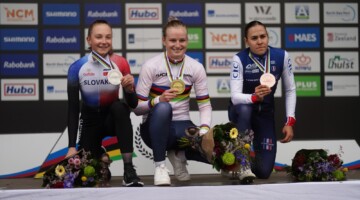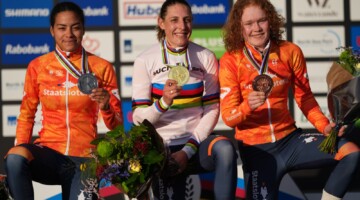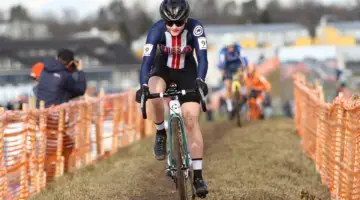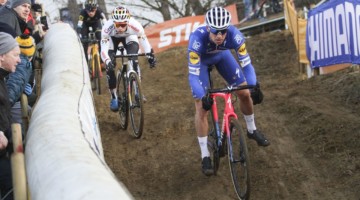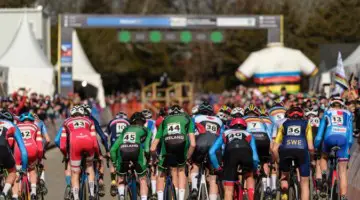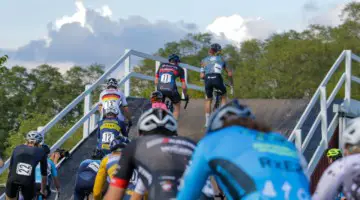Michael van den Ham is an under-23 Elite rider on the Cycle-Smart Elite team. Michael raced for Canada to 31st place at the World Championships in Louisville, Kentucky, and will be racing the New England cyclocross season in hopes of bettering his result in the upcoming Hoogerheide World Championships. Here, and in coming weeks, he’ll be filling us in on what life is like as an Elite cyclocross-specific racer.
Boom, Stybar, John Gadret. Americans Danny Summerhill and Luke Keough… The list of promising cyclocrossers who have left to make their career on the road goes on. Despite ’cross’ rapid growth, many of us ’cross addicts have noted, with rather conflicted emotions, that the road cycling scene holds both clout and appeal for young cyclists that, at least as of yet, our sport does not. While I don’t pretend to be of the same pedigree of any of the aforementioned riders, I hope this piece can spread illumination as too why so many forgo a full ’cross season in favor of cutting short, or missing entirely, that same season too prep for the ever-lengthening road calendar.
As riders such as full-time roadie and former Cyclocross World Championships rider Chris Jones has demonstrated, it is not impossible to do both, but it is certainly not easy. Unless a rider has demonstrated a phenomenal talent, like Logan Owen has, winning both ’cross and road national titles, it seems difficult for a rider to secure a spot on a professional team while still being committed to racing a full cyclocross calendar. And this makes sense: Why would a professional road team select a ’cross rider as a domestique when he or she may be unable to attend some of the training camps and may be unfit and unrested for the early season races? Why do that when they could choose one of the other many capable support riders on any number of amateur teams?
As a result, I feel, and believe this is a sentiment shared by others, that one must choose to be either a ’crosser that races road, or a roadie that does ’cross. Being a ’cross racer and a road racer is, unless you posses the aforementioned exceptional talent, extremely difficult.
So, why are so many of the young North American cyclocrossers choosing to focus on riding the skinny tires? The answer is really quite simple: That is the way that the pro cycling landscape is shaped. In North America, there are 16 UCI Professional cycling teams; two World Tour, two Pro Continental, eight Continental, and four woman’s. According to procyclingstats.com, that means that there are 230 men another 46 women riding for North American professional teams. Now, mind you, this does not necessarily correspond to the number of North American pro’s: Both BMC and Garmin-Sharp are filled with non-American riders and, on the other side of things, a number of Americans (such as our favorite New England pro, Ted King) are riding for teams registered in other countries, but, nonetheless, it vastly overshadows the handful of North American ’crossers’ who are given a paycheck for their mud-filled pastime.
Fortunately for us hurdle-hoppers, this landscape seems to be slowly shifting. Last year, Optum/Kelly Benefit Strategies introduced a dedicated ’cross program that not only allowed a number of their athletes to race cyclocross, but began to acknowledge the publicity potential that running amalgamated racing program holds. Nonetheless, it remains a bit of a developmental gamble for a young athlete such as myself to choose to focus primarily on cyclocross and, in doing such, perhaps miss the more likely chance to make a living racing bikes that road provides.
I suppose the overwhelming question is, then, “Why do I race ’cross if so many of the top opportunities lie elsewhere?” Well, the answer is quite simple really: Just as the 2000-odd paying participants are drawn to the Cross Crusade every fall weekend, I too am drawn to ’cross because it’s fun, and because I love it. Sure, the tarmac holds its appeal. It presents history, tradition, and opportunities that yet elude its muddier younger brother, but it also lacks close-knit and welcoming family type atmosphere that North American cyclocross has become defined by. The reality is, if I were looking for a career ending in stardom and riches, I may have picked the wrong career, not merely the wrong discipline.
Will I ever make the switch? Will I ever become a roadie who races ’cross? I suppose only time will tell, but right now I’m happy to say that I am, first and foremost, a sand-riding, barrier-hurdling, mud-slinging, and beer-drinking ’cross racer. Am I playing a developmental gamble? Perhaps, but am I enjoying my life as a cyclist more because of it? Absolutely.


